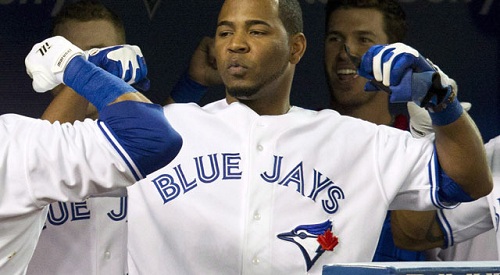
Who cares about the MVP, anyway?
The last few days have been, well, different for Jays fans.
I’m used to a Jay leaving for a big payday on another team. I’m used to Toronto being on the short end of the trade, getting prospects and cash back for a big player or two. I’m used to promises of a five-year plan – spoken or not – maybe one signing and watching a team get by without spending much money.
Last week was the complete opposite. The Jays landed several players from Miami in a deal boosting their payroll to somewhere around $120 million. On Friday, they signed Melky Cabrera to a two-year, $16 million deal. Both are big moves, as notable as anything else coming out of the owners meetings.
I’m not used to this. I’m not used to national columnists writing about the Jays, unless it’s about Brett Lawrie’s helmet toss or Yunel Escobar’s slurs. The 2012 Jays didn’t offer any easy storylines, weren’t especially compelling to watch and their team was drained by injuries. Without Jose Bautista mashing dingers, what else were noted baseball luminaries like Tim McCarver or Joe Morgan supposed to talk about?
[php snippet=1]
But there was one story that everyone south of the border seemed to miss: Edwin Encarnacion’s 2012 season. Through 151 games, he hit for .280/.384/.557 and 44 home runs. He hit for power, avoided hitting into double plays (just six all year long) and was the only Jay with more than five intentional walks. Hell, he didn’t just double his RBI total from 2011, but he nearly doubled his walks, too.
By a country mile, this was Encarnacion’s best season, and he did it while playing on a team below the MLB’s midpoint lines for both batting average and OPS, and they allowed more runs than they scored. Surely, if he hit like he did the year before – .272/.334/.453 – the Jays wouldn’t have even scratched fourth place in the AL East, right? But look at the MVP votes: Encarnacion finished a distant 11th in MVP voting, despite hitting better than Josh Hamilton (a .930 OPS), Adrian Beltre (.921) or Derek Jeter (.791). How come everyone missed this during the endless MVP debates?
Now, awards like the MVP don’t really mean anything. They’re handed out by an association of voters whose ranks have included both Murray Chass and Bill Conlin. They’re not indicative of any one thing, other than getting more points than some other guy.
Arguments between Mike Trout and Miguel Cabrera are framed as an old vs new-school debate: it’s advanced stats like WAR versus older, boxcar stats like RBIs. Writers like Mitch Albom are resorting to lines like: “There is no end to the appetite for categories — from OBP to OPS to WAR. I mean, OMG!” How else are you supposed to create a conflict? Albom couldn’t write a column saying that either one would be a good pick. He has to move the needle! Hence: “I mean, did you do the math? I didn’t. I like to actually see the sun once in a while.”
Well, Albom’s not being indicative of any one argument in particular. The oldest baseball joke I can remember hearing is how many stats baseball has; “And here’s how he hits against right-handed pitchers in a open-roofed stadium, on a sunny Monday afternoon in May.” In so many words, Albom is hacking it, laying an opinion on an award he doesn’t even vote for.
Maybe he’s too busy hosting a radio show and plugging The Timekeeper on PTI to come up with something original. Maybe he doesn’t care because pageviews are pageviews. Does it matter? Albom hasn’t been relevant in years and, for that matter, even when he was, he managed to reduce one of the most compelling college teams of all time to a boring, uneventful and melodramatic book (Rent the DVD instead).
And the thing is, he’s not alone either. In some quarters, Cabera’s MVP award is being hailed as a victory for traditionalists. Never mind that those very writers are the ones who are responsible for handing out that very award.
In “The Image,” historian and author Daniel J. Boorstin writes of “pseudo-events,” which are things created by the media so they can then report on them: news conferences, presidential debates, etc. These are ways mass media are able to keep its machine going, especially now in the 24-hour news cycle. It’s not much of a stretch to include awards handed out by sports media.
It’s the same debate the NBA has every spring: of course LeBron James is the best player in basketball and has been for the past five years, but you can’t just give him an award without some debate and hand-wringing. So the definition of an MVP changes from year to year: sometimes Derrick Rose is more valuable than James, sometimes Kobe Bryant is.
And ultimately, that’s what the AL MVP race boils down to: it’s a flexible format which can be bent to create a debate. When Cabera was handed the award, it wasn’t a victory for old-school sportswriters. It wasn’t saying he’s worth more than Trout, Hamilton or even Encarnacion. It’s just fodder for columnists to angle their opinions in print.
[php snippet=1]

